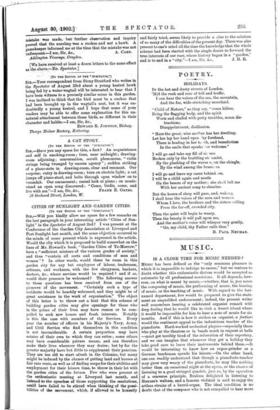CITIES OF SUNLIGHT AND GARDEN CITIES.
[To THE EDITOR OF THE "SPECTATOR.")
you kindly allow me space for a few remarks on the last paragraph in your interesting article " Cities of Sun- light" in the Spectator of August 2nd ? I was present at the Conference of the Garden City Association at Liverpool and Port Sunlight last month, and the same objection occurred to the minds of some present which is expressed in the article. Would the city which it is proposed to build somewhat on the lines of .Mr. Howard's book, Garden Cities of To-Morrow," have a " sufficient mixture of the various grades of society," and thus "contain all sorts and conditions of men and women ? In other words, would there be room in this garden city for any but employers of labour, tradesmen, artisans, and workmen, with the few clergymen, bankers, doctors, &c., whose services would be required ? and if so, would their presence be welcomed ? The following answer to these questions has been received from one of the pioneers of the movement. " Certainly such a type of residents would be heartily welcomed, and they might be of great assistance in the work of organisation." The object of this letter is to throw out a hint that this scheme of building garden cities may give openings for those who in the prime of their lives may have reason or be com- pelled to seek new homes and fresh interests. Notably is this the case with members of the Services. Every year the number of officers in his Majesty's Navy, Army, and Civil Service who find themselves in this condition is not inconsiderable. A certain proportion may have estates of their own to which they can retire ; some others may have considerable private means, and can therefore make their lives wherever they may desire ; but by far the greater majority have but little to supplement their pensions. They are too old to start afresh in the Colonies, but many might be induced by the chance of getting land and houses at fair rate rents, as well as of finding scope for their abilities and employment for their leisure time, to throw in their lot with the garden cities of the future. Few who were present at the enthusiastic meeting at Liverpool last month, and listened to the speeches of those supporting the resolutions, could have failed to be stirred when thinking of the possi- bilities of the movement, which, if allowed to be honestly
and fairly tried, seems likely to provide a clue to the solution of so many of the difficulties of the present day. There was also present to one's mind all the time the knowledge that the whole scheme had been started with the single desire to forward the true interests of our race, whose history began in a " garden,"
and is to end in a " eity."—I am, Sir, Sc., J. H. R.






































 Previous page
Previous page